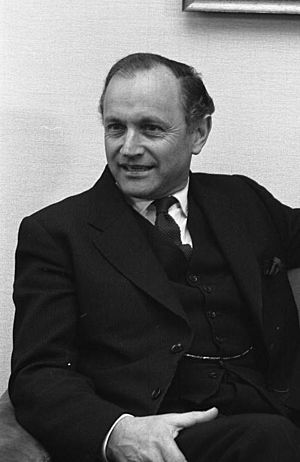Alun Gwynne Jones, Baron Chalfont facts for kids
Quick facts for kids
The Lord Chalfont
|
|
|---|---|

Chalfont during a visit to West Germany in 1966
|
|
| Minister of State for Foreign and Commonwealth Affairs | |
| In office 23 October 1964 – 19 June 1970 |
|
| Monarch | Elizabeth II |
| Prime Minister | Harold Wilson |
| Preceded by | Peter Thomas |
| Succeeded by | Joseph Godber |
| Member of the House of Lords Lord Temporal |
|
| In office 11 November 1964 – 10 November 2015 Life peerage |
|
| Personal details | |
| Born |
Alun Arthur Gwynne Jones
5 December 1919 Monmouthshire, Wales |
| Died | 10 January 2020 (aged 100) |
| Nationality | British |
| Political party | Labour Crossbencher |
| Occupation | Politician Lord Provest |
| Military career | |
| Allegiance | United Kingdom |
| Service/ |
|
| Years of service | 1939–1961 |
| Rank | Lieutenant Colonel |
| Service number | 156400 |
| Unit | South Wales Borderers |
| Battles/wars | |
| Awards | Officer of the Order of the British Empire Military Cross Efficiency Medal |
Alun Arthur Gwynne Jones, Baron Chalfont (born December 5, 1919 – died January 10, 2020) was an important person in British history. He was an officer in the British Army, a British politician, and a writer who focused on history.
Contents
His Early Life and Army Career
Alun Gwynne Jones was born in Monmouthshire, Wales. He went to West Monmouth School and later studied at the University of London. When the Second World War began in 1939, he joined the South Wales Borderers regiment. He became a second lieutenant in 1940.
From 1941 to 1944, he fought in Burma during the war. After the war ended, he stayed in the Army. He was promoted to captain in 1946 and then to major in 1953.
Major Gwynne Jones took part in special operations against rebels in the jungles of Malaysia. He was recognized for his bravery and received the Military Cross in 1957. He later said he was "lucky enough to carry out some successful ones."
He was promoted to lieutenant-colonel in 1960. He also received the Order of the British Empire (OBE) in 1961. He left the army in June 1961.
Becoming a Politician
After his military career, Alun Gwynne Jones entered politics. He became a minister in the Foreign and Commonwealth Office from 1964 to 1970. This meant he helped manage Britain's relationships with other countries.
On November 11, 1964, he was given a special title: Baron Chalfont. This made him a life peer, which meant he could be a member of the House of Lords for the rest of his life. He was known as Lord Chalfont.
Working in Government
In 1967, Lord Chalfont became a spokesperson for the Labour Party government. He worked on a plan to change the status of the Falkland Islands.
What Happened with the Falkland Islands?
In November 1968, Lord Chalfont visited the Falkland Islands. He tried to convince the people living there to consider becoming citizens of Argentina. However, the islanders made it very clear that they wanted to remain British.
When he returned to Britain, he reported that the islanders wished to stay British. He also said that Britain should not give the impression that it wanted to get rid of the islands.
Later Political Life
Lord Chalfont left the Labour Party in the early 1970s. He said it was a "decision of personal and political principle." In 1979, he supported the Conservatives in the general election.
He wrote several books about military history, including some about the Napoleonic Wars. He also served as the chairman of the Radio Authority, which used to regulate commercial radio in the UK. In 1985, he helped start the Institute for the Study of Terrorism.
Lord Chalfont retired from the House of Lords on November 10, 2015.
His Personal Life
In 1948, Alun Gwynne Jones married Mona Mitchell. They had one daughter together. Mona passed away in 2008.
Lord Chalfont lived to be very old. He turned 100 years old on December 5, 2019. He passed away the next month, on January 10, 2020.
Images for kids
See also
 In Spanish: Alun Gwynne Jones para niños
In Spanish: Alun Gwynne Jones para niños
 | Percy Lavon Julian |
 | Katherine Johnson |
 | George Washington Carver |
 | Annie Easley |



